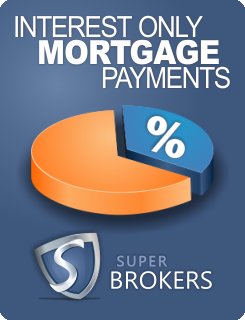Interest Only Mortgage

Whether you have heard of it or not, an interest-only mortgage is something that has raised a lot of conversation here in Canada. Before we get further into the weeds, let’s get the first important thing out of the way: what is an interest-only mortgage?
This is the type of mortgage where the borrower only makes payments on the interest of the mortgage loan. The term for an interest-only mortgage tends to be in the 5-7 year range. Not only that, when that term is done, it is expected that the loan be repaid.
An interest-only mortgage can be repaid in a number of ways like refinancing the home, making a lump sum payment, or paying off the principal of the loan itself. The thing to keep in mind here is that the principal payments will be much higher than the interest payments, so don’t be surprised when that happens.
Apply Now for an Interest-Only MortgageWho Should Consider Interest Only Mortgages?
There are specific types of borrowers that should consider this type of mortgage. If the buyer desires to afford more home now or knows that the home will need to be sold in a short period of time, this is the kind of loan to go with.
Or maybe the buyer wants the initial payment to be lower and is confident that the large payment increase in the future is something they can handle. Lastly, a borrower looking at an interest-only mortgage will be confident that they can get a higher rate of return investing the money elsewhere.
So, it is safe to say that someone new to the housing market or looking to purchase a forever home is not going to want to go with this type of loan.
The Advantages of Interest Only Loans
Like any other kind of mortgage out there, this type of loan comes with its own unique set of positives and negatives. Generally speaking, the advantages of having this kind of loan are pretty straightforward.
The first is that they mean much lower monthly payments during the interest-only term. That can mean greater financial flexibility during that term to perhaps save towards paying off the principal of the mortgage itself.
On the same side of that coin, there is more money to invest. Having that extra money to invest during that 5-7 year period means that there is substantial potential for personal investment growth. That could leave the borrower in a much better position financially when the interest-only portion expires.
For this type of loan, the borrower can purchase a much larger home later by qualifying for a bigger loan amount. During this interest-only period, the whole amount of the monthly payment for mortgages that are up to $750,000 also qualify as tax-deductible, so there are tax savings to be had.
Disadvantages of an Interest Only Mortgage
Like any kind of loan on the market, there are drawbacks to the interest-only loan that bear keeping in mind. Borrowers are susceptible to rising mortgage rates and could find themselves spending that extra money this kind of loan creates instead of investing it. On the same side of that coin, their income may not grow quite as quickly as they had planned.
Another thing to consider is that most people can’t afford the principal payments when the time comes. Not only that, many people aren’t quite disciplined enough to make extra payments towards the principal in order to pay it down at a quicker rate.
Other Risks of Interest Only Mortgages
If the borrower has the payment option ARM and only makes the minimum payments – these don’t include the amount of interest due – that unpaid interest gets added onto the principal and the borrower can end up owing more than what was originally borrowed. If the loan balance itself grows to the limit of the contract, those monthly payments can shoot up and make monthly finances look quite different.
There are advantages to be had, but most who use this type of loan only focus on paying the interest. When the term is expired and it comes time to pay the principal, it can come as a “payment shock” that the borrower feels unprepared for. This can potentially be avoided, but even so, interest rates could rise and create a loan balance high enough to prevent refinancing.
But be aware of potential penalties as well. If the borrower winds up refinancing the loan during the repayment penalty period, there could be additional fees tacked on that can really add up. This is just more money spent by the borrower than they originally considered and another headache to deal with.
How do I get an interest only mortgage?
In order to qualify for an interest-only mortgage, you must have a minimum down payment of 20%, and you may use the mortgage as a line of credit, but may not borrow over a loan to value ratio of 80%. The maximum amortization is 25 years.
Contact Super Brokers to find out if an interest-only mortgage makes sense for you and your future.
Apply Now for an Interest-Only Mortgage Today